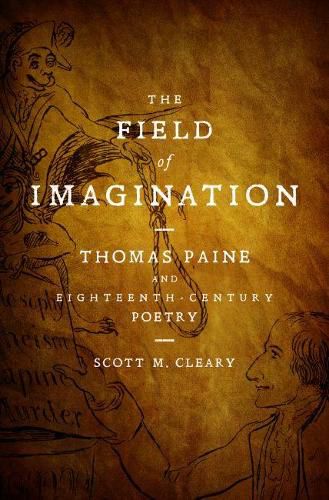Readings Newsletter
Become a Readings Member to make your shopping experience even easier.
Sign in or sign up for free!
You’re not far away from qualifying for FREE standard shipping within Australia
You’ve qualified for FREE standard shipping within Australia
The cart is loading…






One of America’s Founding Fathers, Thomas Paine is best remembered as the pamphleteer who inspired the American Revolution. Yet few also know him as an eighteenth-century poet of considerable repute. In The Field of Imagination, Scott Cleary offers the first book on Paine’s poetry, exploring how poetry written both by and about Paine is central to understanding his development as a political theorist.Despite his claim in the Age of Reason that he was abandoning poetry because it led too much into the field of imagination, Paine never completely left poetry behind. He took advantage of his position as editor of the Pennsylvania Magazine to situate his poetry in relation to the magazine’s tacit support for the emergent urgency of American independence. He drew on two British poets, James Thomson and Charles Churchill, to provide revealing epigraphs for his major early works in support of that independence, and in turn he himself became an influence on early American poets such as Joel Barlow and Philip Freneau.
Paine’s poetry has until now been largely relegated to the status of scholarly curiosity. But whether through his own poetry, his thoughts on the place and function of poetry in the Age of Reason, or his deep influence on the poetry of the early American republic, Paine’s involvement in poetical craft provides a lens onto the unique and tempestuous literary culture of the eighteenth century.
$9.00 standard shipping within Australia
FREE standard shipping within Australia for orders over $100.00
Express & International shipping calculated at checkout
One of America’s Founding Fathers, Thomas Paine is best remembered as the pamphleteer who inspired the American Revolution. Yet few also know him as an eighteenth-century poet of considerable repute. In The Field of Imagination, Scott Cleary offers the first book on Paine’s poetry, exploring how poetry written both by and about Paine is central to understanding his development as a political theorist.Despite his claim in the Age of Reason that he was abandoning poetry because it led too much into the field of imagination, Paine never completely left poetry behind. He took advantage of his position as editor of the Pennsylvania Magazine to situate his poetry in relation to the magazine’s tacit support for the emergent urgency of American independence. He drew on two British poets, James Thomson and Charles Churchill, to provide revealing epigraphs for his major early works in support of that independence, and in turn he himself became an influence on early American poets such as Joel Barlow and Philip Freneau.
Paine’s poetry has until now been largely relegated to the status of scholarly curiosity. But whether through his own poetry, his thoughts on the place and function of poetry in the Age of Reason, or his deep influence on the poetry of the early American republic, Paine’s involvement in poetical craft provides a lens onto the unique and tempestuous literary culture of the eighteenth century.